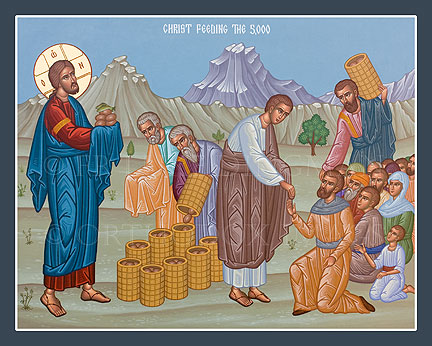The feeding of the 5,000 is a famous miracle of Jesus, but the significance of its placement in Mark 6 is often overlooked. The preceding story is the beheading of John the Baptist. Herod threw a banquet for his nobles and military men, and it was there that John’s head was served up on a platter (6:21-28). Herod kills God’s people and offers their flesh as symbolic food to his guests.
The very next story in Mark 6 is the feeding of the 5,000. Now we see Jesus feeding people. Not with a chopped off head, but with real food – fish and bread. There are two meals in Mark 6. One hosted by Herod, the evil king. The other by Christ, the good shepherd. The text presents us with a competition: Whose party is better? Whose table do you want to eat at? Jesus is placed in contrast to Herod and shown to be a true king. He’s even shown to have his own nobles and military men – the 12 disciples – and they play a large role in this story.
Jesus’ ministry has become so popular that neither he nor the disciples have time to rest or eat (6:31). People from all the towns are rushing to be close to them (6:33). It’s not just Jesus who’s getting the attention, but Jesus and his disciples. They, too, are experiencing fame from their teachings and miracles (6:7, 12-13, 30).
When Jesus sees the crowds, he has compassion on them. He sees that they were like “sheep without a
shepherd” and he begins to teach them many things (6:34). Jesus gives them “verbal food” – the nourishment of God’s word – before giving them physical food.
But the disciples want to send the crowds away. They say, “The hour is late. Send them away, that they may go into the surrounding country and villages and buy themselves bread; for they have nothing to eat” (6:35-36). The disciples are tired and want some privacy; they want dinner themselves! “C’mon, Jesus, can’t we take a break?”
Jesus responds, “Give them something to eat” (6:37). The disciples don’t understand this. It sounds crazy, and probably frustrating (Jesus isn’t letting them take a break!). How are they going to accomplish this task? Where would they find enough food? How would they pay for it? It seemed daunting and impossible.
It’s at that moment that Jesus multiplies the bread and fish. He performs the miraculous act, but it’s the disciples who will do the serving. Mark 6:41 says the disciples were to set the food before the people. It’s the disciples who will go into the multitude and distribute. After eating, they collect 12 baskets of leftovers (6:43). The numerical connection between “12 disciples” and “12 baskets” is obvious. There’s an emphasis on the disciples that we shouldn’t miss.
Jesus is the good shepherd but the disciples function as shepherds themselves, operating under the
instruction of their commander. We often think of the feeding of the 5,000 as a revelation of Jesus’ power and provision. While that is true, this event is also a lesson to the disciples. They didn’t understand what Jesus was doing. They wanted to send the people away, remember? They needed to learn that being a shepherd includes attending to the basic necessities of life – not just to teaching and miracles. Shepherding includes the whole person, body and soul together.
When the disciples made the comment about sending the people away, they didn’t know that Jesus was going to make them serve food. They doubted how he would do it; they didn’t know he would multiply the bread and fish. Did they know that they would end up with exactly 12 baskets of leftovers? No, but I’m sure they got the point when each of them had a full basket.
The disciples are a new Israel – the new 12 tribes – and under Christ, they participate in his mission of shepherding the sheep. The baskets aren’t full just to throw out; they are full in order to feed more. The disciples will continue the work of feeding God’s people, both with physical food and verbal food.
How many times have you not understood what God was doing? Have you ever wanted God to do something different? Maybe you’ve wanted to avoid a responsibility he has giving you. The lesson here is that God establishes us a servants even when we do not realize it; even when we are tired and hungry and feel like we can’t go on.
This can be especially encouraging to pastors and church leaders. I presume that the multitude did not know the disciples were confused and doubting. The crowd sees them distributing food that doesn’t run out! It looks like the disciples are in on it. It looks like Jesus and his disciples are of one mind and mission. Despite your confusion and doubt, God will equip you to serve and lead. People will respect you and follow you even when you don’t have it all together. You must simply obey when Jesus says, “Feed them.” As the church, we are his army, and we must follow our orders.
In this passage, Jesus is the king of an army. He has his noblemen, just like Herod has his. The difference is that Herod commands his men to serve John’s head on a platter; Jesus commands his men to distribute true food – food that actually nourishes. Whose table would you rather serve?
feeding of the 5000, Leadership, pastoral ministry, shepherding



















